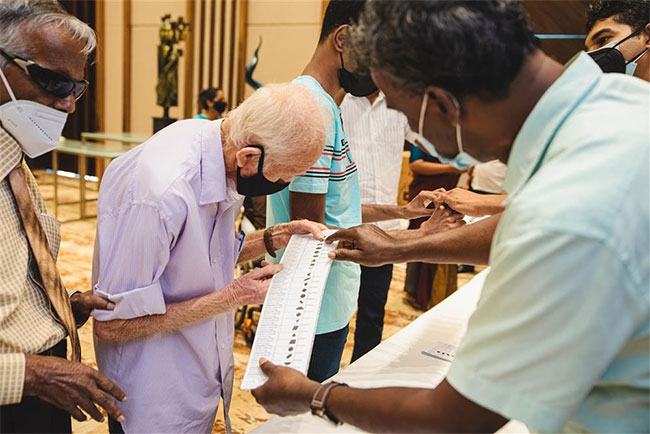Assisted voting for the disabled: Election Commission details new provisions
August 27, 2024 12:59 pm
The Election Commission of Sri Lanka has issued an announcement regarding the legal provisions for voters with disabilities to be accompanied by a person to assist in marking the ballot paper at the polling station.
Accordingly, the election regulatory body stated that the provisions in Section 38(2) of the Presidential Elections Act No. 15 of 1981 as amended by Elections (Special Provisions) Act, No. 28 of 2011 for a person who is totally or partially visually handicapped or physically disabled can be accompanied by another person to assist in marking the ballot paper at the upcoming elections.
The person who accompanies the disabled person should be more than 18 years of age and not a candidate contesting for that election. Similarly, he should not be as an authorized agent, divisional agent or an election agent of a candidate, the Election Commission said in a statement.
In addition, the person who accompanies the disabled person should not be a person subject to any disability.
In order to be accompanied by a person to assist as stated above, a certificate of eligibility prescribed in the Fifth Schedule to the Presidential Elections Act should be handed over to the officers at the polling station, the statement added.
The form to be used to obtain the certificate of eligibility can be collected from District Election Office, Divisional Secretariat, Grama Niladhari Office or the Election Commission’s website (www.elections.gov.lk).
Individuals with visual impairments or other physical disabilities should obtain and complete the application form as described above and submit it to the Grama Niladhari to receive a certificate. Once the certificate is obtained, it should be presented to a Government Medical Practitioner. The Medical Practitioner will then examine the elector and record their findings, certifying the elector’s eligibility on the form, according to the Election Commission.
The election regulatory body further mentioned in its statement that the disabled elector should proceed to the polling station with his official poll card, National Identity Card or any other identity document acceptable at the polling station and this certificate of eligibility accompanied by the assistant. After the polling station staff verify the elector’s identity, a ballot paper will be issued following the standard procedures.
The elector, accompanied by his/her assistant, will then be directed to the Senior Presiding Officer to mark the ballot paper. It is crucial that the assistant carries their National Identity Card or any other identification accepted at the polling station.
At the polling station, the Senior Presiding Officer obtains the eligibility certificate of the elector and the declaration related to Part III of the certificate of eligibility will be recorded from the accompanying person.
The elector and assistant will then be escorted to the voting cubicle along with a member of the polling station staff and will be made to mark the ballot paper and place it in the ballot box before the Senior Presiding Officer and staff member, it added.
The Election Commission further emphasized that an assistant cannot accompany an elector to the polling station without the above certificate of eligibility. After voting, the Senior Presiding Officer will retain the relevant certificate of eligibility.
Additionally, if an elector with disability is unable to bring an assistant, he/she may have his/her ballot paper marked by the Senior Presiding Officer in the presence of another officer, as was the practice in previous elections, according to the Election Commission.












